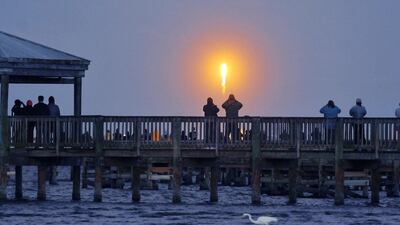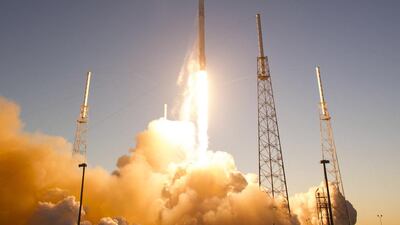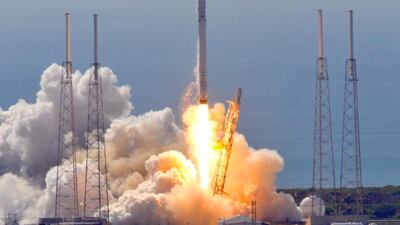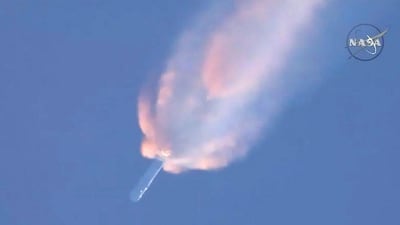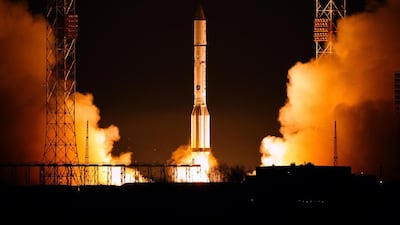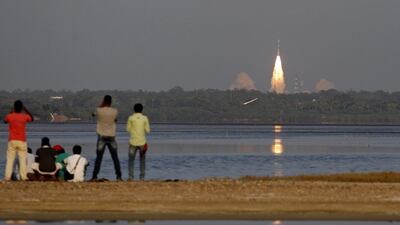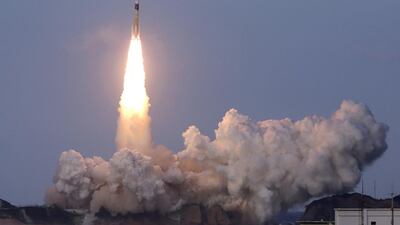Shooting communication satellites into space is inherently risky; you strap a highly-engineered hunk of metal worth up to US$200 million on to what is effectivel a flying bomb and hope it reaches its intended orbit.
No wonder investors hold their breath on launch days. Two spectacular failures last year, including one at Elon Musk’s SpaceX, did not help confidence. Yet it is worth getting past the fear. More than 90 per cent of launches are successful, according to estimates from operators and insurers.
In fact, if you look more closely, it appears that shares in satellite companies do relatively well around launch dates, according to an intriguing analysis by Macquarie’s Andrew De Gasperi.
His curiosity piqued by the sell-off of satellite stocks after the SpaceX explosion, Mr De Gasperi crunched the numbers around 23 launches done by six companies over five years. And it turns out that operators outperform their respective indices by between 4 and 5 per cent on average around a launch, regardless of the holding period.
One interesting example came in August last year for the satellite maker Inmarsat whose rocket lifted off from Kazakhstan following a failed mission in May.
Its shares began to rise exactly at the moment of lift off of the Proton M rocket, which was carrying the Inmarsat-5 F3 communications satellite, at 12.44pm on Augus 28 from Kazakhstan’s Baikonur Cosmodrome. The stock finished the day up nearly 5 per cent or 45.5p to 981p – the top riser on the FTSE 100 that day.
And there is another interesting quirk in the performance around launches. Operators sometimes put up networks of satellites, known as “constellations”, to cover the globe. Around the launch of the second or third satellite in these networks, their shares tend to outperform by double digits. That looks like the market might be over-pricing risk.
Again, with US-based Iridium putting up a new constellation, there will soon be more data to test this idea. The calendar for launches in general looks busy:
Of course, the satellite operators are wrestling with deeper concerns about their business model. The industry, long known for fat profit margins and strong cash flows, is in a period of slower growth caused by overcapacity and lower prices. There is a debate about whether this is temporary or whether competition and new technology mean a permanent reset. Eutelsat shares have fallen 35 per cent since a May profit warning, taking some competitors with it.
Reusability is just the latest effort by SpaceX to lower launch costs, putting pressure on other companies in the commercial launch market to take steps to remain competitive. In the case of Arianespace, this means pressing ahead with development of the Ariane 6, which is designed to be significantly less expensive the current Ariane 5.
“The target is very ambitious,” the Arianespace chairman and chief executive Stéphane Israël told Jeff Foust, the editor and publisher of the online Space Review in a recent article. “We’re confident that, at the end of the day in 2020, we will come with a brand-new rocket 40 to 50 per cent cheaper than Ariane 5.”
International Launch Services (ILS) is also seeking to remain competitive in the market with the half-century-old Proton. The company president Kirk Pysher said it has had some help from exchange rates, in the form of the weaker rouble, but is taking other steps as well. “We are currently working with [Proton manufacturer] Khrunichev to reduce the overhead of the cost of the vehicle, streamlining the operations, streamlining the manufacturing process,” he said.
The Proton will eventually be phased out in favour of heavier versions of the Angara launch vehicle. However, Mr Pysher said that would take longer that previously planned. “We’ve been saying that Angara commercially won’t be available until around the 2025 timeframe. Most likely we’re going to see that push out to the right,” he said. “That means Proton needs be viable for the next 10 to 15 years.”
Japan’s Mitsubishi Heavy Industries (MHI), which has been trying in recent years to play a bigger role in the commercial launch market, hopes to become more competitive with a new launch vehicle of its own. MHI plans to phase out its existing H-2A rocket by the early 2020s, having replaced it with the new, and less expensive, H-3 around 2020. MHI vice president Ko Ogasawara said at the panel that the company hopes to do three or four commercial launches a year starting in 2022.
The increasing number of commercial laucnh firms raises the question of how many launch providers the commercial satellite industry can support. Demand for geostationary (GEO) satellites has not changed significantly despite SpaceX-led reductions in launch costs, with about 25 or so such satellites ordered every year.
One difference is the surge in interest in low-Earth orbit (LEO) satellite constellations, like OneWeb, which plans to launch more than 600 satellites primarily on Soyuz rockets ordered from Arianespace and Virgin Galactic’s LauncherOne dedicated smallsat launch system. A number of other LEO systems are in various phases of study, but even launch companies are not optimistic about them contributing to a sustained increase in launch demand.
“There’s not room for too many of those,” said the SpaceX president Gwynne Shotwell referring to LEO constellations. “You do need to be very cautious about that particular market. First of all, at this point it’s speculative still.” SpaceX, ironically, is studying its own LEO satellite constellation; Ms Shotwell said it is still in the “technology development phase” to see if it is feasible.
Asked about oversupply in the launch market, Ms Shotwell does not sound concerned. “It tends to play out the way it needs to play out,” she said. “I don’t think more than three providers in any vehicle class makes a lot of sense.” For that launch panel, there were four providers on stage.
Mr Pysher agrees. “History has demonstrated that three launch services providers is probably the sweet spot,” he said. There may be room, though, for “niche providers” that can fill a special need for customers that major launch providers, for whatever reason, cannot, he added.
That is the hope of Lockheed Martin Commercial Launch Services (LMCLS), which markets the Atlas 5 commercially. The LMCLS president Steve Skladanek said there is one aspect of the market where people are driven by cost. “There’s also a need for those missions that absolutely cannot fail.
“That is by no means the bulk of the market, but there is still a significant and regular need for a highly dependable, highly accurate, very reliable, very date-certain launch service.”
The Atlas 5, he said, will not be cost competitive, but can target those customers who are willing to pay a premium for reliability and schedule assurance. In 2016, that includes the launch of the WorldView-4 remote sensing satellite in September and the EchoStar 19 satellite in November. Going forward, he said, “we continue to target one to two launches a year”.
“There’s also a need for those missions that absolutely cannot fail,” Mr Skladanek said. “That is by no means the bulk of the market, but there is still a significant and regular need for a highly dependable, highly accurate, very reliable, very date-certain launch service.”
Traditionally, the commercial satellite industry has not placed a particular emphasis on cost, since launch is a fraction of the overall cost of a satellite system. That has helped companies such as Arianespace, who have demonstrated high reliability – the last Ariane 5 launch failure was in late 2002 – while working against SpaceX, which has seen its launch schedules slip and its number of launches each year fall short of goals amid several total failures.
However, some note that the commercial satellite industry is changing, with a greater emphasis on reduced costs. “We understand the customers’ needs. They’re being constant under attack by terrestrial systems that are driving them to seek lower-cost launch services,” Mr Pysher said.
SpaceX, with its current launch costs and drive to further reduce them through reusability, is perhaps better positioned than any other commercial launch provider to capture that shift in demand – provided it can carry out its growing backlog of missions successfully, and on schedule.
Still, any good news is welcome at the moment. If rocket launches are less risky than feared, that is a real booster.
business@thenational.ae
Follow The National's Business section on Twitter
